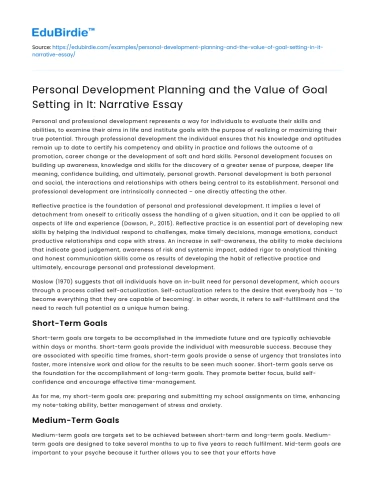Personal and professional development represents a way for individuals to evaluate their skills and abilities, to examine their aims in life and institute goals with the purpose of realizing or maximizing their true potential. Through professional development the individual ensures that his knowledge and aptitudes remain up to date to certify his competency and ability in practice and follows the outcome of a promotion, career change or the development of soft and hard skills. Personal development focuses on building up awareness, knowledge and skills for the discovery of a greater sense of purpose, deeper life meaning, confidence building, and ultimately, personal growth. Personal development is both personal and social, the interactions and relationships with others being central to its establishment. Personal and professional development are intrinsically connected – one directly affecting the other.
Reflective practice is the foundation of personal and professional development. It implies a level of detachment from oneself to critically assess the handling of a given situation, and it can be applied to all aspects of life and experience (Dowson, P., 2015). Reflective practice is an essential part of developing new skills by helping the individual respond to challenges, make timely decisions, manage emotions, conduct productive relationships and cope with stress. An increase in self-awareness, the ability to make decisions that indicate good judgement, awareness of risk and systemic impact, added rigor to analytical thinking and honest communication skills come as results of developing the habit of reflective practice and ultimately, encourage personal and professional development.
Maslow (1970) suggests that all individuals have an in-built need for personal development, which occurs through a process called self-actualization. Self-actualization refers to the desire that everybody has – ‘to become everything that they are capable of becoming’. In other words, it refers to self-fulfillment and the need to reach full potential as a unique human being.
Short-Term Goals
Short-term goals are targets to be accomplished in the immediate future and are typically achievable within days or months. Short-term goals provide the individual with measurable success. Because they are associated with specific time frames, short-term goals provide a sense of urgency that translates into faster, more intensive work and allow for the results to be seen much sooner. Short-term goals serve as the foundation for the accomplishment of long-term goals. They promote better focus, build self-confidence and encourage effective time-management.
As for me, my short-term goals are: preparing and submitting my school assignments on time, enhancing my note-taking ability, better management of stress and anxiety.
Medium-Term Goals
Medium-term goals are targets set to be achieved between short-term and long-term goals. Medium-term goals are designed to take several months to up to five years to reach fulfilment. Mid-term goals are important to your psyche because it further allows you to see that your efforts have not been in vain. They serve as an evaluative tool to further chronicle your development and let you know that you are on the right path. By reaching a mid-term goal, the one who achieves it can further relax and be secure in the fact that they are close to their anticipated outcome. But a medium-term goal is close enough for you to project a specific targeted outcome, while also being distant enough to be meaningful for your longer-term vision.
My medium-term goals are: improving my organizational skills, creating a savings plan, building up my confidence.
Long-Term Goals
Long-term goals are necessary for self-improvement. They give us something to strive for and help keep us focused on where we want to be. Long-term goals help us shape the direction of our lives and careers. Having long term goals in place to guide your everyday life is a great tool for helping you make the right decisions for you, finding more depth in your relationships, and giving you greater purpose. Long term goals are directional and strategic and need not be overly specific and measurable.
My long-term goals are: getting my degree, learning a new skill, learning a new language.
Personal Development Plan
Personal development planning is a lifelong process that allows individuals to assess their skills and qualities, consider their aims in life and set goals with the purpose of realizing and maximizing their potential.
The process of PDP provides a schedule to work to and can lay the basis for continuous learning, a sense of achievement, ensuring long term success and personal growth and making the most of opportunities which may arise. PDP is understood as a cyclical process where improvement comes from moving around the loop. The process is outlined as follows: establishing the purpose and direction, gaining awareness of current standing and future potential within one’s chosen field or sector, gaining a measure of one’s interests, taking account of the organizational realities one can encounter and linking one’s plan to organizational needs. According to Muallim S. (2020), adopting a constructive approach to personal development planning will help individuals consider where they are and where they could go, revitalize technical skills that date very quickly, build up transferable skills and monitor, and evaluate achievements.
One’s development planning depends on one’s life goals that need to be SMART: ‘specific’, ‘measurable’, ‘achievable’, ‘realistic’ and ‘timely’. The SMART acronym refers to the five concepts that must be constantly referred to when setting objectives in order to validate their relevance. It promotes the achievement of concrete results by focusing on the tangible and quantifiable aspects of objectives.
Conclusion
This paper analyzed the notion of personal and professional development and underlined the importance of personal development planning as a continuous lifelong process of nurturing, shaping and improving skills and knowledge to ensure maximum effectiveness in all areas of life. It was discussed how adopting a constructive approach to personal development planning can help the individual excel personally, professionally and academically. This report also called attention to the value of short-term, medium-term and long-term goal setting in PDP by highlighting personal life examples.






 Stuck on your essay?
Stuck on your essay?

